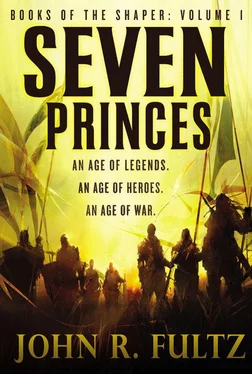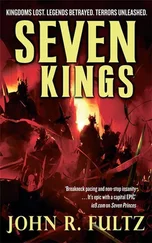John Fultz - Seven Princes
Здесь есть возможность читать онлайн «John Fultz - Seven Princes» весь текст электронной книги совершенно бесплатно (целиком полную версию без сокращений). В некоторых случаях можно слушать аудио, скачать через торрент в формате fb2 и присутствует краткое содержание. Жанр: Фэнтези, на английском языке. Описание произведения, (предисловие) а так же отзывы посетителей доступны на портале библиотеки ЛибКат.
- Название:Seven Princes
- Автор:
- Жанр:
- Год:неизвестен
- ISBN:нет данных
- Рейтинг книги:5 / 5. Голосов: 1
-
Избранное:Добавить в избранное
- Отзывы:
-
Ваша оценка:
- 100
- 1
- 2
- 3
- 4
- 5
Seven Princes: краткое содержание, описание и аннотация
Предлагаем к чтению аннотацию, описание, краткое содержание или предисловие (зависит от того, что написал сам автор книги «Seven Princes»). Если вы не нашли необходимую информацию о книге — напишите в комментариях, мы постараемся отыскать её.
Seven Princes — читать онлайн бесплатно полную книгу (весь текст) целиком
Ниже представлен текст книги, разбитый по страницам. Система сохранения места последней прочитанной страницы, позволяет с удобством читать онлайн бесплатно книгу «Seven Princes», без необходимости каждый раз заново искать на чём Вы остановились. Поставьте закладку, и сможете в любой момент перейти на страницу, на которой закончили чтение.
Интервал:
Закладка:
Vireon turned and saw the charred walls of Shar Dni across the river. Red fires danced like crazed Giants, and pillars of black smoke rose from the streets. They were not the ritual smokes of the temples. The holy pyramids were piles of rubble; slim towers stood ablaze. The stench of burning flesh hung over the valley, and the bridge to the Western Gate was gone, great chunks of it lying in the river. The Orra ran black with blood, or oil, or both. The husks of burned ships lay along its banks, tilted on their sides like dead fish.
In the harbor a fleet of black warships flew the emblem of the white panther.
30
True to his word, he placed her in his throne room between two fluted pillars. She was a statue of white granite flecked with gray, and even a discerning eye would see her as no more than a finely crafted sculpture. Yet the only eyes in the great hall were Elhathym’s, and he knew she was a slave of living stone. He had restored her to human height and would keep her in this petrified state until it pleased him to do otherwise. Or he might simply forget about her, until her thoughts grew thick and dull as the granite of her body. For now she lingered fully conscious inside her stone form, imprisoned but aware of everything that passed in the royal chamber.
What had once been a sun-bright dome where the Yaskathan Kings held feasts, rituals, and entertainments was now an austere vault of gloom. Tapestries of black wool obscured the soaring window casements so that no sunlight could intrude on the usurper’s court. Statues of former Kings and Queens had fallen to mounds of dust in their niches. Three great braziers burned with eldritch fires that never waned and required no oil or tender. The rich carpets and wall hangings depicting the histories of Yaskatha were gone, replaced by drapes of crimson fabric stitched with the hair of corpses. A pile of bleached skulls sat where the Vizier’s podium used to stand.
The Great Hall of Trimesqua was now more tomb than throne room. About the royal dais concentric rings of sigils, wards, and runes were carved into the marble floor. Elhathym sat and brooded in the jeweled throne at their center. Near his chair stood a tall mirror of murky obsidian, its frame embroidered with tiny carved demons. Often he stared into the volcanic glass, and Sharadza saw and heard the things that he saw and heard there.
At times he trailed a finger along her chin or breast, anticipating a delicacy he would devour later. His touch brought a rush of fear into her stone heart. But always he wandered into the shadows, or back to his throne to mumble incantations and stare into the enchanted glass. Terrified servants or cautious generals entered through the chamber’s high doors. Elhathym spoke with them in tones of menacing calm, or raged and brutalized them, giving orders that were followed to the letter. Once he killed a trembling cup-bearer with a touch of his finger. The man had spilled drink at his feet. Other servants hauled his corpse from the chamber, and there were no more clumsy servitors. Mostly the tyrant sat in his mausoleum throne room alone, but for the mute presence of the stone girl between the pillars.
After several days of captivity she became aware of the dark jade nestled at the center of her granite being. It was the amulet given to her by Indreyah the Mer-Queen. She had forgotten it, but had worn it when Elhathym’s sorcery overcame her own. The words of Indreyah echoed in the chambers of her stone brain.
And if you wear it while you sleep, we may speak together in dreams.
As an entity of living rock, she could not truly sleep, but neither was she fully awake. She lingered somewhere along the line between Life and Death, near the drowsy kingdom of Sleep. She pulled her attention away from the tyrant’s bleak hall toward the crossroads of Dream and Death. The shard of jade thrummed inside the granite effigy. Elhathym’s attention was elsewhere, so she hoped he could not hearould not it.
She swam through the dark emerald waters of dream, across aqueous gardens thick with anemone and iridescent schools of fish. The coral palace opened before her, and she saw the Sea Queen on her oyster-shell throne. Her silvery scales were phosphorescent, and she turned the amber slits of her eyes toward her visitor. Here Sharadza was no longer stone, but neither was she flesh and blood. This was her dream-self, an extension of her bodiless consciousness. And this was not truly the Mer-Queen’s hall, but a dream place created by their thoughts.
“Princess,” Indreyah greeted her with a pearly smile. “It pleases me to see you again. You have learned to use the trinket I gave you.”
“I have,” said Sharadza. “There is little else I could do in my present state. I seek your aid.”
“Let us walk in the gardens as we did before,” said the Queen. Now they stood among the waving sea-plants and gliding manta rays of her aquatic courtyards. Sharadza told her of Iardu and Khama. She spoke of the confrontation with Elhathym that had killed them both and left her a prisoner of stone in the conquered palace of Yaskatha. Indreyah listened intently, strands of green-black hair swirling in a halo above her heart-shaped face.
The orbs of the Queen’s eyes grew wide when she heard Iardu’s fate. “You say the Shaper… Iardu… is dead?”
Sharadza bowed her head. Dream tears floated like diamonds from her eyes, rising like bubbles of air. Iardu had loved Indreyah, and perhaps she had once loved him. Sharadza hated to be the bringer of bad news. Yet what other news was there in these times?
“No,” said Indreyah. She looked toward the distant surface of the sea as a land woman might stare into the sky. Perhaps her senses extended far beyond the roof of her sunken kingdom. She seemed to observe some distant vista or scene before turning back to Sharadza. “No. Iardu cannot be dead. If he were, I would feel it. We once shared a bond… that I cannot explain. We are linked in subtle ways that have more to do with spirit than flesh. He might eventually perish in some distant eon, but he lives now. This I can tell you without doubt.”
Sharadza told her about the black void spewing from Elhathym’s mouth, and Iardu’s plunge into that vortex of darkness. It had utterly consumed him. She saw it herself. Unless…
“Iardu lingers somewhere,” said the Mer-Queen. “Perhaps he is imprisoned as you are. You must find him if you can. Tell me more of this Elhathym.”
She told Indreyah about the enchanted mirror. “He keeps it near his throne and peers into it every day. It brings him visions. I could not understand most of these, but I did see the Empress of Khyrei reflected there, and I heard her speak to him. There were flames, and bloody shadows swirled about her… the Spirits of Vakai.”
“Did you hear their words, child?”
“He demanded she return something to him… some things he had given her. She refused, saying she needed them for her own plans, and he grew angry. Next I saw him conjure an image of Uurz in the glass. Emperor Dairon assembled his legions there, preparing fo preparir war.”
“You are clever,” said the Mer-Queen. “Here is what you must do. When Elhathym next leaves his chamber, you must take command of this mirror. It is a Glass of Eternity. Only two are said to exist in this world. Concentrate your will upon it, and it will show what you wish to see. Use its power to find Iardu.”
Sharadza stepped over the coils of a lazy octopus crossing the garden. “But I am caught in a cage of granite,” she said. “How can I-”
“Give me your hand,” said Indreyah. “Sorcery is driven by willpower. Elhathym’s is far greater than yours, so he keeps you locked in this granite form. That is his will. Yours must only be greater than his and the spell will break.” She held Sharadza’s dream-hands and put her scaled forehead against the girl’s own. “My will added to yours, child… through the power of our dreaming minds… together we may bend the elements to our will.”
Читать дальшеИнтервал:
Закладка:
Похожие книги на «Seven Princes»
Представляем Вашему вниманию похожие книги на «Seven Princes» списком для выбора. Мы отобрали схожую по названию и смыслу литературу в надежде предоставить читателям больше вариантов отыскать новые, интересные, ещё непрочитанные произведения.
Обсуждение, отзывы о книге «Seven Princes» и просто собственные мнения читателей. Оставьте ваши комментарии, напишите, что Вы думаете о произведении, его смысле или главных героях. Укажите что конкретно понравилось, а что нет, и почему Вы так считаете.












